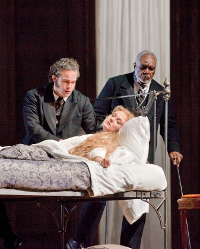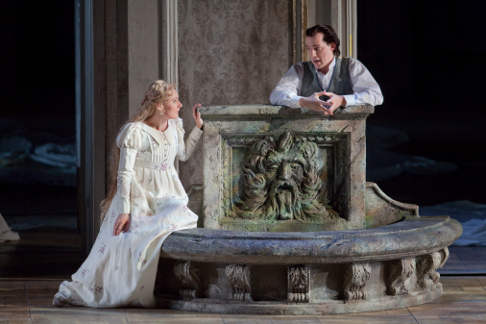Recently in Performances
English Touring Opera are delighted to announce a season of lyric monodramas to tour nationally from October to December. The season features music for solo singer and piano by Argento, Britten, Tippett and Shostakovich with a bold and inventive approach to making opera during social distancing.
This tenth of ten Live from London concerts was in fact a recorded live performance from California. It was no less enjoyable for that, and it was also uplifting to learn that this wasn’t in fact the ‘last’ LfL event that we will be able to enjoy, courtesy of VOCES8 and their fellow vocal ensembles (more below …).
Ever since Wigmore Hall announced their superb series of autumn concerts, all streamed live and available free of charge, I’d been looking forward to this song recital by Ian Bostridge and Imogen Cooper.
Although Stile Antico’s programme article for their Live from London recital introduced their selection from the many treasures of the English Renaissance in the context of the theological debates and upheavals of the Tudor and Elizabethan years, their performance was more evocative of private chamber music than of public liturgy.
Evidently, face masks don’t stifle appreciative “Bravo!”s. And, reducing audience numbers doesn’t lower the volume of such acclamations. For, the audience at Wigmore Hall gave soprano Elizabeth Llewellyn and pianist Simon Lepper a greatly deserved warm reception and hearty response following this lunchtime recital of late-Romantic song.
For this week’s Live from London vocal recital we moved from the home of VOCES8, St Anne and St Agnes in the City of London, to Kings Place, where The Sixteen - who have been associate artists at the venue for some time - presented a programme of music and words bound together by the theme of ‘reflection’.
'Such is your divine Disposation that both you excellently understand, and royally entertaine the Exercise of Musicke.’
‘And there was war in heaven: Michael and his angels fought against the dragon; and the dragon fought and his angels, And prevailed not; neither was their place found any more in heaven … that old serpent … Satan, which deceiveth the whole world: he was cast out into the earth, and his angels were cast out with him.’
There was never any doubt that the fifth of the twelve Met Stars Live in Concert broadcasts was going to be a palpably intense and vivid event, as well as a musically stunning and theatrically enervating experience.
‘Love’ was the theme for this Live from London performance by Apollo5. Given the complexity and diversity of that human emotion, and Apollo5’s reputation for versatility and diverse repertoire, ranging from Renaissance choral music to jazz, from contemporary classical works to popular song, it was no surprise that their programme spanned 500 years and several musical styles.
The Academy of St Martin in the Fields have titled their autumn series of eight concerts - which are taking place at 5pm and 7.30pm on two Saturdays each month at their home venue in Trafalgar Square, and being filmed for streaming the following Thursday - ‘re:connect’.
The London Symphony Orchestra opened their Autumn 2020 season with a homage to Oliver Knussen, who died at the age of 66 in July 2018. The programme traced a national musical lineage through the twentieth century, from Britten to Knussen, on to Mark-Anthony Turnage, and entwining the LSO and Rattle too.
With the Live from London digital vocal festival entering the second half of the series, the festival’s host, VOCES8, returned to their home at St Annes and St Agnes in the City of London to present a sequence of ‘Choral Dances’ - vocal music inspired by dance, embracing diverse genres from the Renaissance madrigal to swing jazz.
Just a few unison string wriggles from the opening of Mozart’s overture to Le nozze di Figaro are enough to make any opera-lover perch on the edge of their seat, in excited anticipation of the drama in music to come, so there could be no other curtain-raiser for this Gala Concert at the Royal Opera House, the latest instalment from ‘their House’ to ‘our houses’.
"Before the ending of the day, creator of all things, we pray that, with your accustomed mercy, you may watch over us."
The doors at The Metropolitan Opera will not open to live audiences until 2021 at the earliest, and the likelihood of normal operatic life resuming in cities around the world looks but a distant dream at present. But, while we may not be invited from our homes into the opera house for some time yet, with its free daily screenings of past productions and its pay-per-view Met Stars Live in Concert series, the Met continues to bring opera into our homes.
Music-making at this year’s Grange Festival Opera may have fallen silent in June and July, but the country house and extensive grounds of The Grange provided an ideal setting for a weekend of twelve specially conceived ‘promenade’ performances encompassing music and dance.
There’s a “slide of harmony” and “all the bones leave your body at that moment and you collapse to the floor, it’s so extraordinary.”
“Music for a while, shall all your cares beguile.”
The hum of bees rising from myriad scented blooms; gentle strains of birdsong; the cheerful chatter of picnickers beside a still lake; decorous thwacks of leather on willow; song and music floating through the warm evening air.
Performances
![Magdalena Koženà as Mélisande and Stéphane Degout as Pelléas [Photo by Ken Howard courtesy of Metropolitan Opera]](http://www.operatoday.com/PELLEAS_Kozena_and_Degout_7454a.png)
31 Dec 2010
Pelléas et Mélisande, New York
Pelléas et Mélisande, Debussy’s impressionist drama closely
based on Maeterlinck’s eerie, symbolist play, is not a terribly vocal opera; it calls more for the subtlety of art song style than the belting of great divas and divos.
Therefore it makes me a bit uneasy to report
that the latest Met revival features the best all-around cast the company has
fielded (theatered?) all season, nearly flawless from top to bottom, no one
vocally out of her or his league, everyone suited to the scale of the work and
to singing it at the Met—at least when Simon Rattle is in the pit,
keeping the evening in flawless balance.
 Magdalena Kožená as Mélisande, Gerald Finley as Golaud and Willard White as Arkel
Magdalena Kožená as Mélisande, Gerald Finley as Golaud and Willard White as Arkel
Jonathan Miller’s production removes Maeterlinck’s tragedy from
the mystical, pre-Raphaelite mists in which the playwright set it to a definite
location: an English country house in the Merchant-Ivory style. Miller’s
feeling seems to be that we have forgotten the once-upon-a kingdoms of fairy
tale, that we nowadays have similar half-sensual half- memories related to the
forgotten refinements and restraints of the turn of the century world. This
does not always fail of its proper effect, though killing with broadswords
seems a little strange. I do not quite understand why Mélisande, first
discovered in a Jungian wood far from the rest of the action, weeping into a
forest pool, is already within the walls of the house. Surely her tragedy, in
part, is that she begins and remains an outsider? For Miller, evidently,
“Allemond,” the name of Arkel’s kingdom, is truly
all-the-world, and just as there is no place to flee, there is no outside for
Mélisande to have come from.
The singers, an extraordinary ensemble, perform with sensitivity and grace.
Every sound they make is musically grateful and lulls one into the texture of
Debussy’s tone poem. Stéphane Degout’s ardent Pelléas is nicely
contrasted with Gerald Finley’s agonized and menacing Golaud. Willard
White and Felicity Palmer give moving performances as the helpless elders Arkel
and Geneviève. Neel Ram Narajan’s boy soprano reaches all the notes with
perfect support and has no trouble filling the house. He is often called upon
to “witness” the actions of the incomprehensible adults, and he
acts bravely. (In one clever Miller touch, Yniold’s scene with the
Shepherd becomes a nightmare, sing in bed.)
 Magdalena Koženà as Mélisande and Stéphane Degout as Pelléas
Magdalena Koženà as Mélisande and Stéphane Degout as Pelléas
The one member of the cast who did not seem quite acclimatized with the
rest, perhaps appropriately, was Lady Rattle, Magdalena Koženà, who sang
Mélisande, that quintessential outsider. It was easy to put her accented French
down to the character’s foreignness; this did not bother me at all. More
awkward was her air of conscious coquetry, of flirting with Pélleas, of
manipulating those about her. This is not appropriate to Mélisande
whose innocence is precisely the keynote of her character. Koženà stares,
as required, at the actions of others, but her stare does not seem to imply
wonder or puzzle; simply a languid lack of interest. Innocence is a commodity
that Maeterlinck’s admirers longed for, missing their pre-Freudian,
pre-Darwinian youth perhaps; if we can no longer believe in it, we still must
have a Mélisande who incarnates it to perform the opera properly.
The hero of the evening, shining despite the brilliance of so extraordinary
a group of singers, was conductor Sir Simon Rattle in his Met debut. His
Pelléas et Mélisande was of so measured a pace that the moments of
rising tension, imminent violence, came upon us with an almost shocking
suddenness and, as the stage action remained calm, tied us more closely to the
internal states that the score tends to paint in any case. His sureness and
lightness of touch permitted the singers to project conversationally without
any strain or push. He brought us to our feet.
John Yohalem
![Magdalena Koženà as Mélisande and Stéphane Degout as Pelléas [Photo by Ken Howard courtesy of Metropolitan Opera]](http://www.operatoday.com/PELLEAS_Kozena_and_Degout_7454a.png)

